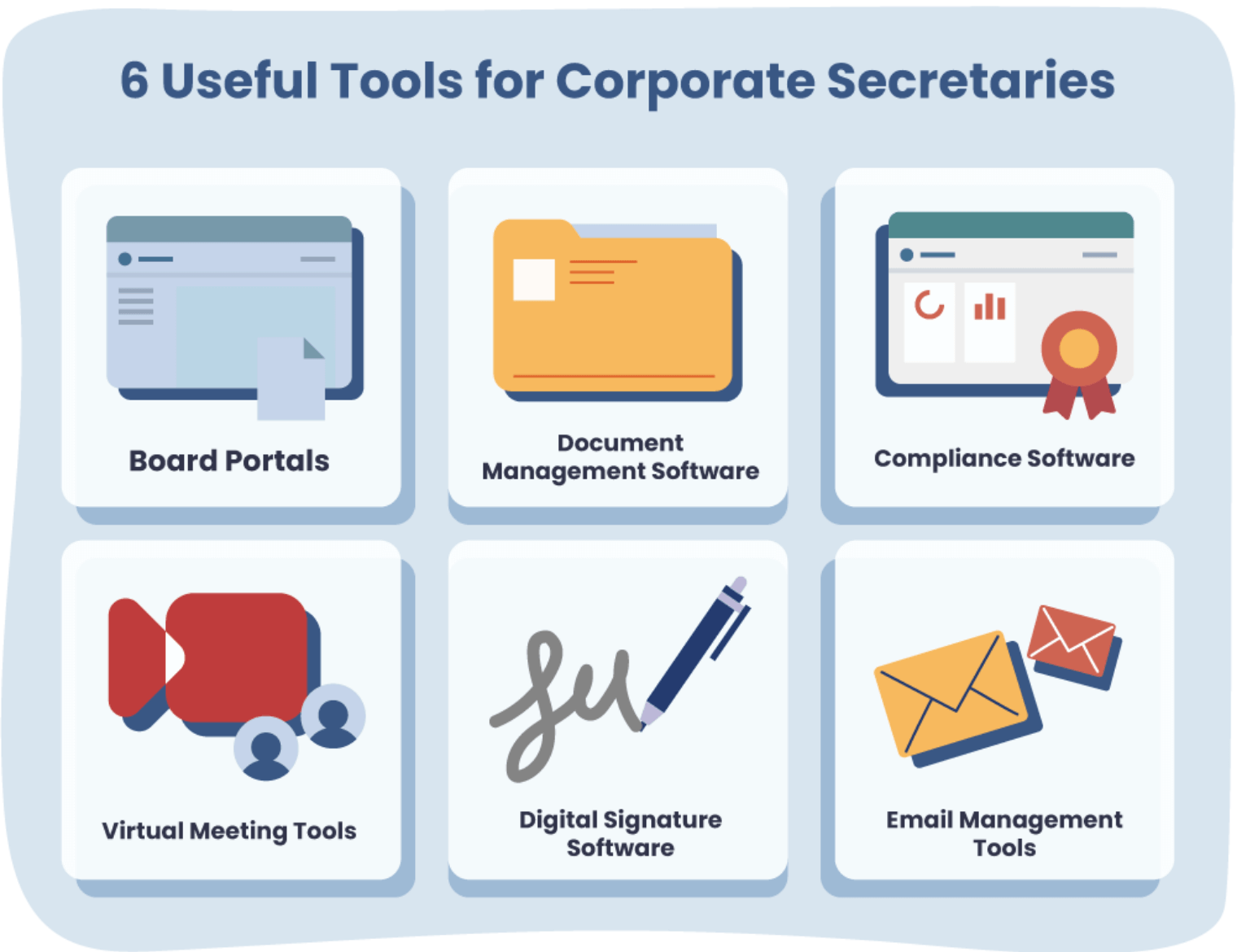Corporate secretaries are known to be essential players in the corporate world. They are even considered key guardians of corporate governance, trusted to help companies comply with legal and regulatory requirements and keep its board well-organized and functional. But their roles are often misunderstood and overlooked.
Traditionally, the role of corporate secretaries has been to provide administrative support to boards of directors and senior management. They typically manage company records, prepare board meeting agendas and minutes, and help with the company’s compliance with applicable laws and regulations.
In recent years, however, their role has evolved to include a more strategic focus, working closely with senior management. They have become more involved in driving business growth and ensuring that the company’s strategy is aligned with its objectives and values. Find out more in the next sections.
The Evolving Role of Corporate Secretaries
Corporate secretaries have an increasingly critical role in corporate governance, serving as a vital link between the board of directors and senior management. While their traditional duties include maintaining company records and organizing board meetings, corporate secretaries now play a bigger role in promoting good governance practices. They can also help in the development and implementation of governance policies and procedures and assist in maintaining transparent and ethical decision-making.
In today’s business environment, where companies face increased scrutiny and regulatory requirements, the role of the corporate secretary has become even more vital. They are responsible for maintaining a culture of compliance and ensuring that their organization operates with integrity in mind. As secretaries become more crucial in maintaining the corporate governance framework, companies now see them as key governance professionals essential to its growth and success.
Roles and Responsibilities of a Corporate Secretary

Corporate secretaries can have multiple responsibilities within an organization. But their functions go beyond simply organizing board meetings and taking notes. Here are a few of the key roles that corporate secretaries play.
Record Keeper
As the record keeper, the corporate secretary maintains all the company’s legal documents, including meeting minutes, resolutions, contracts, and regulatory filings. They ensure that all documents are accurate, up-to-date, and accessible to the board of directors, shareholders, and other stakeholders as needed. They are responsible for storing, retrieving, and managing corporate documents, and can even help in creating the records as well.
Meeting Organizer
Corporate secretaries are responsible for planning and executing meetings for the organization, such as board meetings, shareholder meetings, and committee meetings. They make sure that all participants are fully informed and prepared for the meeting, and that meetings run smoothly and efficiently.
The secretary is also responsible for creating meeting agendas, coordinating meeting logistics, recording the minutes, and preparing meeting materials, such as reports and presentations.
Corporate Advisor
The secretary may also act as a corporate advisor to the board of directors and senior management. They provide strategic advice on corporate governance, compliance, and risk management. Plus, stay up-to-date with governance trends and best practices to recommend to the board.
A corporate secretary also helps in overseeing the training of new directors. They may provide orientation on corporate governance and legal compliance, or suggest the best training and education programs to keep the board informed on best practices and ensure the company operates ethically and responsibly.
Compliance Officer
As the compliance officer, the corporate secretary ensures the organization complies with all applicable laws, regulations, and industry standards. They remain up to date with the relevant by-laws and corporate charters and administer compliance with the company’s code of conduct. In other words, they play a critical part in protecting the organization from legal and reputational risks.
Additional Board Support
Corporate secretaries also give additional support to the board of directors through drafting and reviewing board materials, coordinating board activities, and facilitating communication between board members and senior management. They may provide any necessary administrative support to ensure that the board can focus on strategic decision-making.
Overall, the multifaceted role of corporate secretaries is essential to the effective operation and compliance of any organization. Without their support, a company would struggle to navigate the complex world of corporate governance.
Do all companies need corporate secretaries?
Not all companies are required by law to have a corporate secretary, and may vary depending on the country and the organization’s jurisdiction. In the United Kingdom and Australia, public companies are required to have a secretary, while for private companies, appointing one is optional.
In the US, appointing a corporate secretary varies by state. Some states like California require a secretary, while others like Delaware do not. As for publicly listed corporations in South Africa and Canada, appointing a secretary is required.
While it may not be legally required for all companies to have a corporate secretary, it is worth considering the benefits of having one in terms of promoting transparency, accountability, and good governance.
A nonprofit organization, for instance, can appoint a corporate secretary to provide administrative board support, ensure compliance with funding and reporting requirements, and manage donor-related matters, such as donor communications and stewardship efforts.
Top Qualifications of a Corporate Secretary
The qualifications of a corporate secretary may vary depending on the organization’s jurisdiction and specific requirements. Generally, the board of directors is responsible for the appointment or selection of a corporate secretary.
In some cases, the CEO or company president may have a role in this, as they may also work closely with the secretary in managing day-to-day operations. The process for appointing or selecting a corporate secretary may vary depending on the company’s bylaws, internal policies, and applicable laws and regulations.
Listed are some of the top qualifications for a corporate secretary that companies should look for.
Knowledge of corporate governance
A deep understanding of corporate governance principles, legal and regulatory requirements, and administrative processes is essential. Corporate secretaries should have extensive knowledge of local and international laws and regulations.
Professional certifications or licenses
In some jurisdictions, corporate secretaries may be required to hold professional certifications or licenses, such as the Institute of Chartered Secretaries and Administrators (ICSA) qualification or membership in a relevant professional organization. Having professional certifications and licenses demonstrates the secretary’s credibility and competence, as well as their adherence to ethical standards.
Legal knowledge
A corporate secretary should have a good understanding of legal and regulatory requirements to assure compliance and provide advice to the board. They play an important role in managing legal risks and ensuring that the company’s actions are ethical and lawful, which prevents legal and reputational issues.
Ethical and trustworthy
As corporate secretaries handle sensitive information, they must maintain the highest ethical standards to build trust with stakeholders. They must act in the best interests of the organization and avoid conflicts of interest. Their ethical behavior and trustworthiness are vital in upholding the reputation of the company in the eyes of its stakeholders.
Communication skills
A corporate secretary serves as a key liaison between the board of directors, senior management, and other stakeholders. As such, excellent communication skills are crucial. Both verbal and written communication is essential to effectively communicate with the board and senior executives in various contexts, such as board meetings and shareholder meetings.
Other critical aspects of effective communication include the ability to maintain confidentiality and clearly convey complex information, may it be board recommendations or best practices.
Strong time-management skills
Corporate secretaries must be able to prioritize tasks and manage their time effectively to meet deadlines and ensure that all legal and regulatory requirements are met. They must also be able to work well under pressure and adapt to changing priorities.
Strong organizational skills are also essential for a corporate secretary to deliver multiple responsibilities in a timely manner and ensure the company complies with best practices. This involves tasks like managing company records, coordinating meetings, and providing support to the board and senior management.
6 Useful Tools for Corporate Secretaries

In today’s fast-paced business landscape, corporate secretaries can use a range of tools to improve their productivity and stay up-to-date with the latest industry trends. Here are the top tools that corporate secretaries can use:
- Board portals: Such tools provide corporate secretaries with a secure online platform for storing and accessing board materials, promoting better communication and collaboration among board members, and enhancing data security through features like two-factor authentication and data encryption. Board portals like Convene are ideal all-in-one tools that can streamline board management processes, helping secretaries perform their jobs more efficiently.
- Document management software: This software helps corporate secretaries store, organize, and access important documents, such as board minutes, policies, and legal documents. It ensures that documents are stored securely, and can be easily retrieved when needed.
- Compliance software: This tool helps corporate secretaries track regulatory changes, manage compliance workflows, and generate reports. Compliance software ensures that the company operates in compliance with legal and regulatory requirements.
- Virtual meeting tools: With the rise of remote work, virtual meeting tools such as Zoom and Microsoft Teams have become essential for corporate secretaries. They help to facilitate virtual meetings, ensure effective communication, and improve collaboration between teams.
- Digital signature software: Digital signature software allows corporate secretaries to sign and manage documents electronically, reducing the need for printing and scanning. Secretaries can then easily send out and track board documents required for approval and signing.
- Email management tools: Email management tools help corporate secretaries manage their email inboxes more efficiently, categorize emails, and prioritize important messages. This way, secretaries won’t miss any updates relevant to their functions.
By using these tools, corporate secretaries can streamline their workflow, improve communication, and ensure that their company operates more effectively.
How Convene Can Help Corporate Secretaries

Corporate secretaries are vital to any well-run organization. But as keeping up with the evolving demands of the role can be taxing, having the right board portal solution is advised to simplify the work of corporate secretaries.
Convene is a premier board portal solution that offers efficient note-taking capabilities, comprehensive collaborative tools, and upgraded security features to benefit corporate secretaries. With Convene, secretaries can elevate the standards of their meetings, streamline the distribution of board materials, and improve data security. Corporate secretaries can now take their board meetings to next level and ensure effective governance.
Discover more about how Convene can help corporate secretaries streamline their work. Try Convene now and get a free 30-day trial!
Jielynne is a Content Marketing Writer at Convene. With over six years of professional writing experience, she has worked with several SEO and digital marketing agencies, both local and international. She strives in crafting clear marketing copies and creative content for various platforms of Convene, such as the website and social media. Jielynne displays a decided lack of knowledge about football and calculus, but proudly aces in literary arts and corporate governance.










